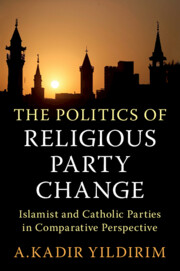Refine search
Actions for selected content:
6 results
Introduction
-
- Book:
- The Politics of Religious Party Change
- Published online:
- 22 December 2022
- Print publication:
- 05 January 2023, pp 1-20
-
- Chapter
-
- You have access
- HTML
- Export citation
1 - Explaining Religious Party Change
-
- Book:
- The Politics of Religious Party Change
- Published online:
- 22 December 2022
- Print publication:
- 05 January 2023, pp 21-50
-
- Chapter
- Export citation
List of Interviews
-
- Book:
- The Politics of Religious Party Change
- Published online:
- 22 December 2022
- Print publication:
- 05 January 2023, pp 297-300
-
- Chapter
- Export citation

The Politics of Religious Party Change
- Islamist and Catholic Parties in Comparative Perspective
-
- Published online:
- 22 December 2022
- Print publication:
- 05 January 2023
The Global Economics of European Populism: Growth Regimes and Party System Change in Europe (The Government and Opposition/Leonard Schapiro Lecture 2017)
- Part of
-
- Journal:
- Government and Opposition / Volume 54 / Issue 2 / April 2019
- Published online by Cambridge University Press:
- 04 December 2018, pp. 193-225
-
- Article
-
- You have access
- HTML
- Export citation
Anti-System Parties Revisited: Concept Formation and Guidelines for Empirical Research
- Part of
-
- Journal:
- Government and Opposition / Volume 53 / Issue 4 / October 2018
- Published online by Cambridge University Press:
- 10 May 2017, pp. 653-681
-
- Article
-
- You have access
- HTML
- Export citation
